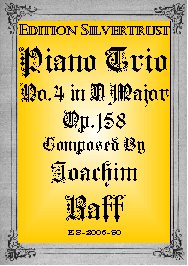Presents
Joachim Raff
Piano Trio No.4 in D Major, Op.158
 Given the
fact that today, Joachim Raff (1822-1882) and his music are all but forgotten,
it is hard to believe that from 1870 to 1910, he was generally regarded as one
of Germany's four or five leading composers along with Wagner, Brahms and Liszt. All of the critical commentaries which appeared during those years spoke of him
as an equal to such masters as Mendelssohn, Schumann, Brahms, and Tchaikovsky.
Incredibly, by the 1920's his music had all but disappeared from the concert
stage.
Given the
fact that today, Joachim Raff (1822-1882) and his music are all but forgotten,
it is hard to believe that from 1870 to 1910, he was generally regarded as one
of Germany's four or five leading composers along with Wagner, Brahms and Liszt. All of the critical commentaries which appeared during those years spoke of him
as an equal to such masters as Mendelssohn, Schumann, Brahms, and Tchaikovsky.
Incredibly, by the 1920's his music had all but disappeared from the concert
stage.
Raff was born near Zurich and his family had hoped he would be come a school teacher, but music was his first love. Basically self-taught, Raff sent some of his early compositions to Mendelssohn who immediately recognized his talent and arranged for their publication. Unfortunately, Mendelssohn died before he could help Raff much more. The young composer then approached Liszt who also took an interest in him and took him on as his personal secretary and copyist. During the six years he spent with Liszt, Raff became a member of the so-called "New German School" led by Wagner and Liszt. Although he broke from them in 1856, he was still regarded as a Wagnerite by the supporters of Brahms and the other classicists. In short, Raff was in neither camp, but attacked by both. Isolated, he went his own way, paying little attention to the musical politics of late 19th century Germany.
But going his own way was hardly an easy proposition. Nearly starving, for many years Raff was forced to crank out compositions for the commercial market (works that would sell but were of little intrinsic or artistic merit), one after another as fast as he could. Sadly, this was later to tarnish his legacy. After his reputation had faded, he was regarded merely as a composer of parlor pieces, despite the magnificent symphonic and chamber works he left behind. Anyone who has had the time to hear these great works quickly realizes that Raff could be an impeccable craftsman when he had the luxury of time and was not forced to write for the home music-making marketplace.
Piano Trio No.4 was composed shortly after his Third Piano Trio and actually published the year before it in 1871. The opening Allegro, begins with a sparkling series of 16th notes in the piano while the cello introduces the noble main theme in its lower register. The development and second theme are somewhat lighter in nature. The second movement, marked Allegro assai, is a scherzo. The first theme is a heavy-footed dance, conjuring images of ogres moving about in caves. This is followed by a lovely, lyrical second theme. This is followed by an very impressive slow movement, Andante quasi larghetto. Here, Raff creates the same kind of magical feeling that Mendelssohn achieved in his Songs Without Words. Highly romantic throughout, a "lovers' duet" between the strings is particularly fine. Yet the ending brings an elegiac sense of loss with it. Then a jolt as the finale, Allegro, brusquely dispels the calm, reflective mood of the preceding movement. Restless and driving, the main theme has a very modern feel to it while at the same time having some similarity to a tarantella. Particularly striking are the harsh chords in the piano which repeatedly interrupt an idea or theme without warning, creating a uneasy feeling of something ominous approaching. It all leads to an exciting conclusion. This is another piano trio which should be revived and brought back into the concert hall.
We believe both professionals and amateurs alike will find this a highly attractive work and a welcome addition to their repertoires.
Parts: $29.95